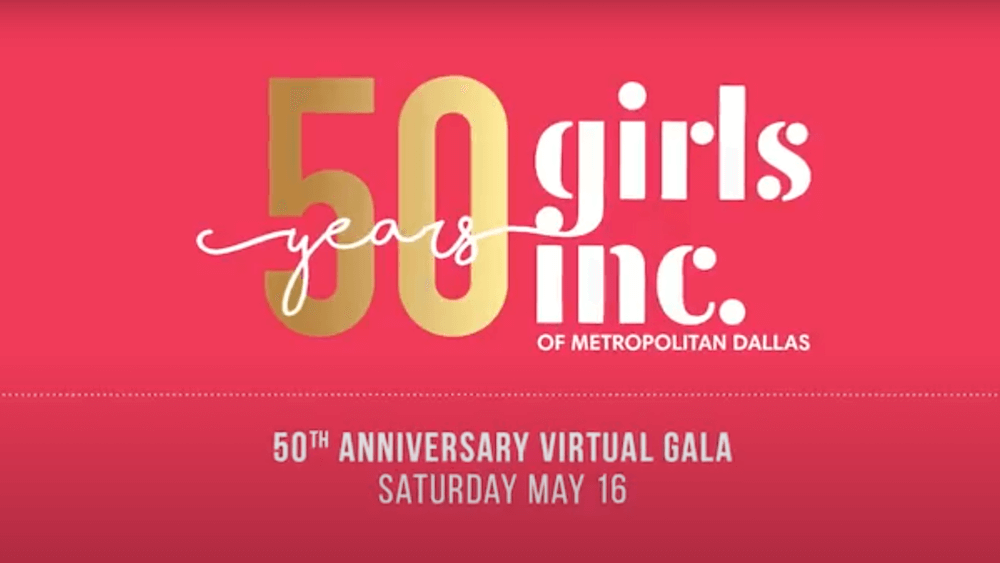
Girls Inc. of Metropolitan Dallas used Zoom breakout rooms to replicate the experience of sharing a table with others at a gala — and the virtual event ended up exceeding an ambitious fundraising goal.
In mid-March, planning was underway for the 50th anniversary fundraising gala for Girls Inc. of Metropolitan Dallas, which aims to help girls conquer gender, economic, and social barriers, to be held at Dallas warehouse-turned-special-events-venue sixty five hundred on May 1. Then, the CDC came out with the recommendation against gatherings of more than 50 people; the gala was expected to draw 500 people.
“It was evident we weren’t going to be able to have it at all for quite some time,” said Beth Myers, chief executive officer of the Girls Inc. of Metropolitan Dallas, an independent affiliate of Girls Inc. As is the case with many nonprofits, Myers said, her chapter lacked the technological capabilities and funding to ever consider holding a digital event before COVID-19 struck.
So it wasn’t necessarily expected, Myers said, “that we had to go virtual” for the fundraising gala. “I think it was more a decision that we would go virtual and take the risk. And that’s kind of an important distinction, because essentially, we were faced with just canceling the event and not do it at all, or to wait and do it in person another time. And when we looked at what were we trying to achieve with our event and the timing, we decided we would do a virtual event.”
In order for it to be successful, Myers felt it was important to be one of the first fundraising events of its kind out of the gate, while the majority of Dallas residents were still sheltering in place. From the time the decision was made to hold a digital event until the time the event streamed live on May 16, the organization had three weeks to put together their first-ever digital event.
Meeting Fundraising Goals
When putting the virtual event together with the help of Soliman Productions and event technology agency DAHLIA+, Myers said the organization wanted to keep intact the in-person gala’s key objectives: to celebrate the chapter’s anniversary and raise a certain dollar amount — $25,000 to guarantee a donor’s match of an $25,000. That meant that organizers would need to attract attendees (i.e., donors) who were new to Girls Inc. The in-person event was driven by donors and sponsors who would fill out tables with their colleagues, family, and friends. But without the promise of socialization, live testimonials, and entertainment that a face-to-face event could provide, Myers wasn’t sure if they could reach the attendance level necessary to meet their fundraising goals.

Beth Myers
People would come to the physical event “because they’re invited by their friend or their colleague and there’s drinks and food,” Myers said. But she wasn’t sure that sponsors and hosts would invite others to the virtual event, “because there was no table to sit at,” she said, “and so we felt like where originally we’d have somebody who would’ve filled eight seats, they’re probably not going to fill eight seats now.”
Fortunately, Myers said, the organization had a connection with musician Meghan Trainor, who agreed to record a special message and an intimate performance from her home. “I think that helped us on a small budget get the marketing we needed,” Myers said. “More outlets were willing to pick it up. When we put it on social, it created more buzz. And so more people knew we were going to do this event and could register [for free].”
The event itself was a 30-minute program that, in addition to Trainor’s performance, featured recorded video testimonials from young women who benefited from Girls Inc.’s services — presentations that would’ve happened live during the originally scheduled event — and other videos highlighting the organization’s work. The program also had a live emcee: Gloria Campos, a retired Dallas-area news anchor and active member in the Girls Inc. community, livestreamed from her home to introduce segments and keep tabs on the organization’s fundraising achievements throughout the program. Less than 20 minutes into the program, the organization’s goal was surpassed by $10,000. In total, the event raised $70,000, with $25,000 coming from one sponsor.
After Hours
Myers wanted to ensure sponsors were given a special experience during the event. DAHLIA+ helped the organization set up virtual tables, powered by Zoom, that allowed table hosts and their chosen guests to socialize after the main program. The event had 50 “tables” in total, which were placed into 10 rooms of five tables each as a cost-saving measure to cut down on the number of breakout rooms needed.
“We called it a virtual party room,” Myers said. “At an event, you’re sitting near other tables, but you really don’t engage with those tables unless you know those people. So that was the challenge. How are we going to get essentially strangers to engage with each other that were at these tables? There were ideas of we could send all of the guests something and have it delivered, and then they bring it into their camera view in their room that night,” she said, but “we just didn’t have the budget to do those kinds of things for our event.”
Instead, tables were presented with conversation starters to help break the ice. Each party room had a designated lead facilitator who was in charge of making a toast to Girls Inc. of Metropolitan Dallas’ anniversary, taking a digital group photo, and getting the conversation flowing. From there, tables were given funny polls to help lighten the mood.
“That got people kind of unmuting and laughing,” Myers said. “And then people who did know each other would kind of poke at each other or say funny things, and other people would laugh too. Because then you’re kind of feeling like it’s not so awkward, and you’re getting to know other people.”
The experience, Myers said, allowed her to see the possibilities for future virtual events. “It opened my mind a lot to what all the fun engagement and opportunities there are,” Myers said, “that probably wouldn’t have come to my mind if I hadn’t been forced to think about how to pull something off.”
Casey Gale is an associate editor at Convene.
